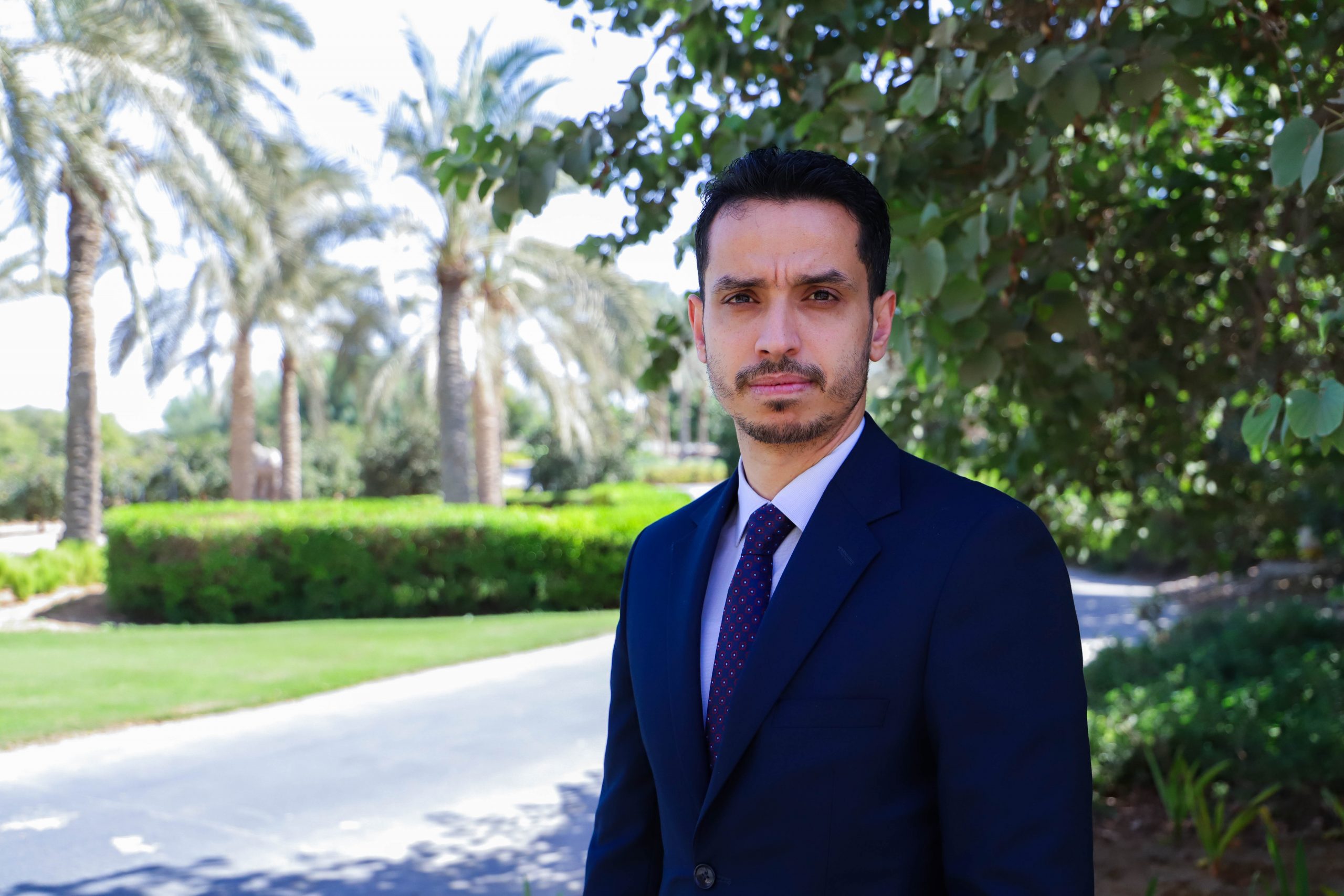- Reporters: Nourhan Amer & Jana Nour ElDin
- Editor: Farida Yassin
Mohammad Hamdona had no choice but to flee with his two daughters across the border with Egypt if he was to have any hope of surviving the brutal Israeli war on Gaza.
He decided to seek sanctuary in Egypt after his sister and her entire family were killed in Israeli aerial bombardment, and his home lay in rubble.
“The journey of displacement started by looking for an escape, for my family and I, from the start of the conflict on October 7, since my house was located specifically in Gaza,”
Hamdona, a newly appointed visiting professor of law who joined AUC this semester. His home, he explained, had been in the Sheikh Radwan neighborhood of Gaza, earmarked as the most dangerous by the Israeli military, who ordered civilians to evacuate. Before deciding to make the trip to Egypt in December 2023, he had already been displaced seven times within the Gaza Strip itself.
Egypt was already familiar to him since he earned his Master’s and PhD degrees from Alexandria and Mansoura Universities, respectively.
Although it is difficult to obtain a visa abroad as a Palestinian—the passport is ranked 96th in terms of travel freedom according to the Henley Passport Index—it didn’t stop him from trying to find a solution.
Hamdona started communicating with international academies, and was aided by the Middle East Studies Association (MESA), a non-profit organization.
The MESA Global Academy, aided by other corporations, helps displaced scholars in the MENA region connect to other areas abroad since theirregion’s conflict disables them from their research work in humanities and social sciences.
“I entered Egypt on March 9 as a human who had lost everything; my house, my car, my office. I came to Egypt as a human looking for life,” said Hamdona.
Hamdona’s struggle is not atypical of Palestinians in the conflict. With 18 universities serving about 87,000 students utterly destroyed, along with schools and nurseries, entire generations of students lost the means to continue their education.
“During that time, I was not thinking about continuing a career, because all the students I taught were now martyrs. I wanted to survive,” he said.
Hamdona mourns the loss of his colleague, Sufyan Tayeh, president of the Islamic University in Gaza, who was killed in an Israeli attack in December 2023.
Tayeh was ranked in the top two percentile of researchers in the world in 2021, according to the Palestinian Information Center.
“His death caused a managerial crack in the university’s system,” said Hamdona.
The Islamic University in Gaza, like other institutions of higher learning, was razed to the ground by Israeli bombardment on October 11, 2023. Undeterred, universities turned to online education on May 20, 2024, with a full semester shortened into a four-week period.
“The [semester’s] month had to be compressed into one week. And the fifth week is for exams. The students do not have access to electricity, the internet, papers, or physical books. I used to have around 350 students, now they’re almost 90. It is a life or death situation,” explained Hamdona.
Even though he was not in Gaza, Hamdona continued to teach his students remotely from Cairo, trying to salvage what was left of their education for the surviving students.
“One of the students came and told me, ‘I learned, got educated, and passed. At any moment I could die. What will I gain from this certificate?”.
Now at AUC, he merges his education and experience in his pedagogy. He makes it a point to integrate the Palestinian conflict into his curricula because it is not merely a regional issue, but one that is globally humanitarian, he argues.
“Palestinians are standing against injustice now after 76 years of occupation, and the political and legal aspects of the conflict must be taught and addressed,” he said.
With regard to the curricula within Arab school educational institutions, Hamdona believes that they do not educate students enough and delve deep into the Palestinian issue.
“Generally, the Arab youth, not only Egyptians, have a lack of knowledge in regards to the Palestinian conflict. This is due to a plethora of reasons, specifically it not being prevalent in school curriculums,” said Hamdona.
Few Arab countries include the Palestinian conflict in their curricula. Algeria and Jordan, for example, include Palestine’s history and culture as part of the Arab region while also explaining the roots of the Israeli- Palestinian conflict. In Egypt, the issue of Palestine falls under the history category.
Hamdona recalls funny moments when asked why the Palestinian army doesn’t fight back against the Israeli military.
“It’s the simplest piece of information to know that Palestine doesn’t have an army in the first place. Sometimes, we must excuse these people,” he said.
He added that any individual, no matter their religion, gender, or nationality, is directly affected by the Palestinian issue in one way or another.
“I am not trying to convince anyone of the injustice of the conflict, because anyone with a mind and a brief background would be, at the least, in cooperation with the Palestinian issue,” explained Hamdona.
In the meantime, Hamdona is eager to share his knowledge about the Israeli-Palestinian conflict with the AUC community.
“On October 7, the clock of life stopped ticking for me and the entire Palestinian nation. I am not excluded from my nation, but rather I might be the least harmed in comparison to the people of my nation,” Hamdona says.
“Coming here rehabilitated me because they were very big shocks, very big shocks, that need years till we can go back. Thanks to AUC.”
“That is why I have to revise everything on the daily so that when a project is due, my memory does not need to be exercised.”
